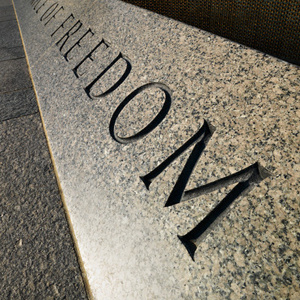Freedom before Justice
By Babak Ahmadi

Unrestrained power, concentrated power which ignores the principle of trias politica, power that acts in the name of citizens but is actually against them, is deleterious. Things were quite clear for those philosophers and theoreticians who founded modern democracy: it was only through unquestioned rule of law that elective government and the principle of representation became meaningful and applicable. Great liberal thinkers aspired to authoritative, legal institutions that resisted the increasing power of the establishment. The threat rising from dictatorship of the majority had made them aware of the necessity to have institutions which guaranteed and defended rights of the minority. Dictatorship of majority urged the far-sighted writers of U.S. Constitution to set up the Senate –in which states had the same number of representatives- against the Congress, where the number of representatives for each state corresponds to its population.
To tame its inclination towards corruption and autocracy, political power (the government or the establishment with its bureaucratic machinery and security-military institutions) should be literally controlled by society’s civil institutions. Limited government, advocated by contemporary liberal thinkers, is easier to control. A nation aware of its basic rights will found institutions that preclude the government from violating its rights. If so, the government (establishment) will enjoy the Greek kratia: power [to handle the affairs]. The Persian equivalent for kratia, i.e. salāri [domination] seems to be mistranslation.
Democracy means that citizens (in fact, the majority of them) establish a system that not only possesses sovereignty, but is also able to control and administer social affairs. The conventional understanding of governing as the domination of a specific group (be it a social class, elite etc.) is inaccurate. That is why I think translating democracy (a Greek temr rooted in Athens’s historical democratic experience) to mardom- salāri [domination of people/citizens] is incorrect. To have an accurate understanding of this term, we should develop a new understanding of politics and think of the ’power to handle the affairs’ instead of ’domination’. Evaluation of government’s authority should be with regard to the direct effect of its key function, that is, control, management and planning social affairs.
The relation between justice and freedom is a crucial issue which demands a comprehensive introduction and lengthy debates. I only refer to one of the most important outcomes of such debates, though here is no space for a theoretical defense of this notion.
However, based on logical and theoretical arguments and historical experiences, it can be proved that in the political life of different societies, promotion of freedom and protection of citizens’ democratic rights has reinforced social justice, though social justice may be far from the ideal impartiality. On the other hand, political forces or regimes failed to establish justice and guarantee people’s rights, whenever they embarked on furthering justice (in form of social equality), and prioritized it over freedom. Conversion to autocratic systems is one danger of such justice campaigns.
When alienated from efforts to reinforce freedom, the justice campaign (or chanting egalitarian slogans) not only minimizes freedom, but also turns equality into a mere ideal that is abused by the establishment to justify its misdeeds. With freedom of speech and freedom of circulation of information actually non-existent, social privileges will be monopolized by those who have their grip on political power.
To tame its inclination towards corruption and autocracy, political power (the government or the establishment with its bureaucratic machinery and security-military institutions) should be literally controlled by society’s civil institutions. Limited government, advocated by contemporary liberal thinkers, is easier to control. A nation aware of its basic rights will found institutions that preclude the government from violating its rights. If so, the government (establishment) will enjoy the Greek kratia: power [to handle the affairs]. The Persian equivalent for kratia, i.e. salāri [domination] seems to be mistranslation.
Democracy means that citizens (in fact, the majority of them) establish a system that not only possesses sovereignty, but is also able to control and administer social affairs. The conventional understanding of governing as the domination of a specific group (be it a social class, elite etc.) is inaccurate. That is why I think translating democracy (a Greek temr rooted in Athens’s historical democratic experience) to mardom- salāri [domination of people/citizens] is incorrect. To have an accurate understanding of this term, we should develop a new understanding of politics and think of the ’power to handle the affairs’ instead of ’domination’. Evaluation of government’s authority should be with regard to the direct effect of its key function, that is, control, management and planning social affairs.
The relation between justice and freedom is a crucial issue which demands a comprehensive introduction and lengthy debates. I only refer to one of the most important outcomes of such debates, though here is no space for a theoretical defense of this notion.
However, based on logical and theoretical arguments and historical experiences, it can be proved that in the political life of different societies, promotion of freedom and protection of citizens’ democratic rights has reinforced social justice, though social justice may be far from the ideal impartiality. On the other hand, political forces or regimes failed to establish justice and guarantee people’s rights, whenever they embarked on furthering justice (in form of social equality), and prioritized it over freedom. Conversion to autocratic systems is one danger of such justice campaigns.
When alienated from efforts to reinforce freedom, the justice campaign (or chanting egalitarian slogans) not only minimizes freedom, but also turns equality into a mere ideal that is abused by the establishment to justify its misdeeds. With freedom of speech and freedom of circulation of information actually non-existent, social privileges will be monopolized by those who have their grip on political power.

